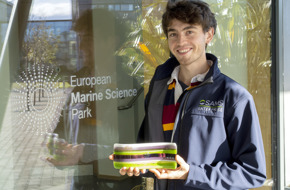Highlights
- New seaweed nursery development using innovative technology and processes - there are many uses for seaweed, such as food for people, animal feeds, pharmaceuticals, cosmetics, biomaterials and bioenergy.
- Supports job creation and skills development in fragile rural, coastal communities.
- Over the past year SAMS Enterprise have received 80+ enquiries and have had a highly successful 2021 season with deployments.
- There are many direct social benefits through employees and the local community.

SAMS Enterprise is a wholly owned subsidiary of the Scottish Association for Marine Science (SAMS), established in 2002. SAMS Enterprise provide specialist marine consultancy services, underpinned by cutting-edge science and world-renowned expertise within SAMS. SAMS Enterprise’s VIBES 2021 award recognised their successful Seaweed Nursery redevelopment.
Seaweed is an underestimated resource that provides food and shelter to marine life. There are many potential uses for seaweed, such as a food source for people - often referred to as a ‘superfood’, that is rich in iodine and calcium and contains natural antioxidants, minerals and amino acids. Seaweeds are also increasingly used for animal feeds, pharmaceuticals, cosmetics, biomaterials and bioenergy.
SAMS Enterprise received £150,000 funding from SAMS and HIE to catalyse industry growth by creating the UK’s leading seaweed nursery using innovative techniques and technology, with high levels of biosecurity and sustainability. The newly renovated SAMS Enterprise Seaweed Nursery provides seed material across the UK, including guidance on all aspects of seaweed husbandry and cultivation. The team maintain a bio-secure seedbank of commercially desirable seaweed varieties sourced from across the UK and work with clients to source material for specific locations as required, in keeping with licencing requirements. Current species include the kelp Saccharina latissima, Alaria esculenta and various Laminaria spp., although new species and cultivation techniques are always being explored.
The seaweed nursery will contribute to UK NetZero aspirations and requirements under the Climate Change Act, Clean Growth Strategy, and development of a low carbon economy, while safeguarding the future of the marine environment. It will also generate cost savings for farmers, from community groups to commercial organisations, creating opportunities for new applications/ products for this versatile bioresource. It will support projects from commercial farms focused on carbon sequestration and sustainable food production to innovative community-level ecological projects restoring and enhancing marine ecosystems.
The social benefits of this redevelopment could see job creation and skills development throughout the supply chain, particularly in fragile rural and coastal communities. The Seaweed Nursery is expected to play a crucial role in supporting rural, coastal livelihoods and communities.